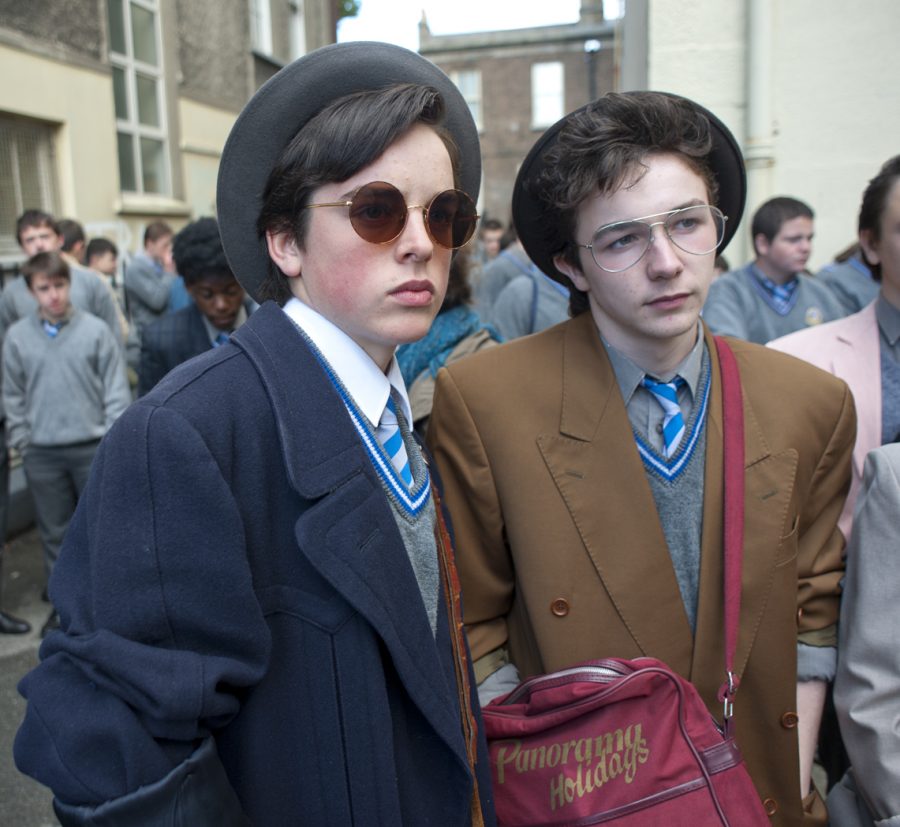Irish lad Ferdia Peelo-Walsh on ‘Sing Street’
Courtesy The Weinstein Company
First time actor Ferdia Peelo-Walsh was selected for the role of Conor after a six-month hunt throughout Ireland for fresh, young talent.
April 25, 2016
Director John Carney’s “Sing Street” is a musical coming-of-age tale set in Dublin during the ’80s. The film stars newcomer Ferdia Peelo-Walsh as Conor, a 14-year-old Irish lad who uses music to escape the dreary reality of Ireland’s economic depression.
Peelo-Walsh was selected for the role of Conor after a six-month hunt for untapped young talent throughout Ireland. Although he is new to acting, Peelo-Walsh comes from a musical family and is classically trained in opera and piano.
The Chronicle spoke with Peelo-Walsh about his experience as a first-time actor, the music of the ’80s and Dublin’s changes over the years.
THE CHRONICLE: What kind of personal and professional lessons did you learn while filming “Sing Street”?
FERDIA PEELO-WALSH: I learned how to be an actor. I had never acted before, so I was learning how to deal with the experience of being on set. There was a big learning curve for me. It was quite bizarre, and there was a lot to take in. Also, I didn’t know much about music from the ’80s. I had to dive in, watch lots of music videos and learn all about ’80s culture. There’s no better way to learn about the ’80s culture than to make a movie about it because you have to immerse yourself in it.
Not having grown up in the ’80s, did you find it difficult to relate to the music in the film?
I hadn’t really discovered the ’80s yet. I was 14 years old, and I was only getting into [my generation’s] music. I had to watch a lot of music videos and immerse myself in it. Obviously, putting on the costumes and hanging around an ’80s set also helps.
How do you think today’s popular music has changed from the music of the ’80s?
Pop music is totally different. Songs in the ’80s had very drastic lyrics. I think music has definitely been dumbed down because that’s what sells. The simpler and the more repetitive the song is, the bigger the song is.
Music has a different meaning to each of the characters in “Sing Street.” What does music mean to you?
My favorite relationship in the film is the relationship between the characters and their music. First, [Conor] forms a band to get a girl, but as the film goes on, it becomes more than that. He becomes very inspired by these ’80s pop bands, and it becomes his way of escaping. He finds refuge in being at home with his guitar. He’s transported to another world. That’s a huge part of teenagers’ lives because they’re going through such a funny time, and it’s their way of escaping.
How do you think the Dublin of the ’80s depicted in the film differs from Dublin today?
First of all, a recession was happening in Dublin in the ’80s. So, nobody had any money. Everybody was having a bit of a rough time. That’s why it was a good time period to set this film in. The adults in this film are very caught up in their own world because they don’t have any money and home life is s–t for these kids. [“Sing Street”] has a kind of John Hughes vibe because the kids just have to break free on their own. Their parents don’t give them any attention whatsoever. That’s why [Dublin] is such a weird site in the film. It’s totally different than what you would have seen [in America] in the ’80s. What everyone was seeing on TV was a colorful world with loads of money and white lads out on yachts in [Los Angeles]. Back in dark, gloomy Ireland where nobody has any money, they felt like they had to break free. It was a weird time, but we got through it.








